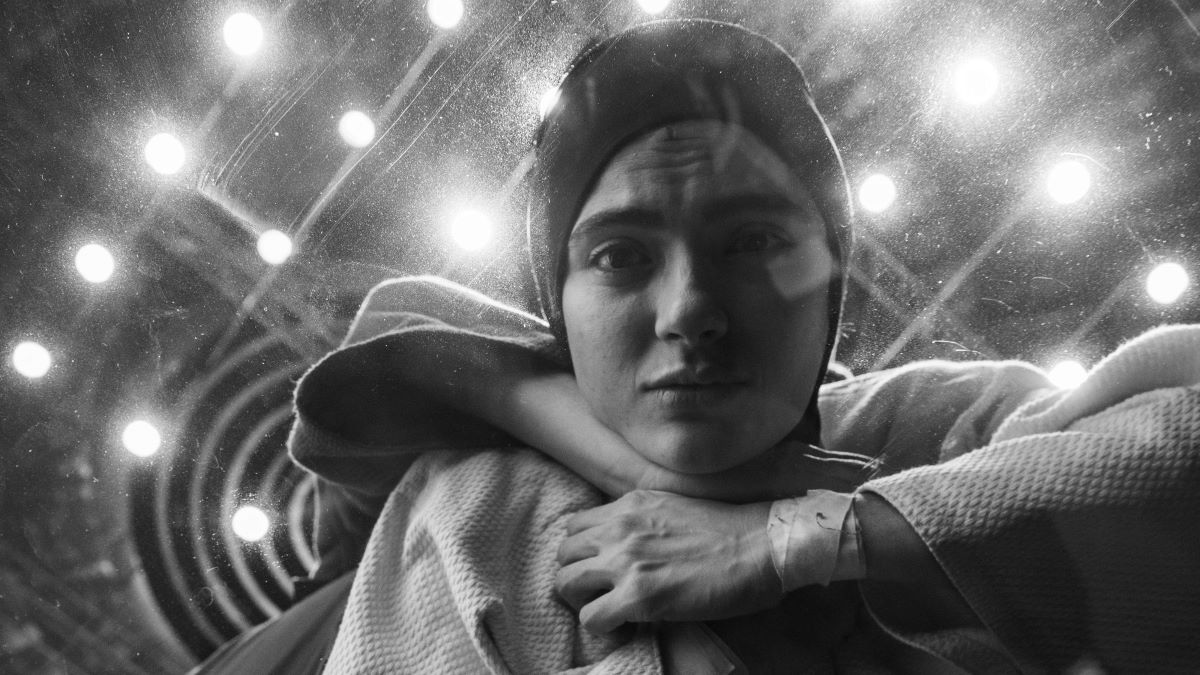MOVIE REVIEWS
Tatami (2023)
Zar Amir Ebrahimi, Guy Nattiv
During the world judo championships, Iranian judoka Leila and her coach Maryam receive an ultimatum from the Islamic Republic instructing Leila to fake an injury and lose the match, or else be branded a traitor to the state. With her own freedom and that of her family at stake, Leila faces an impossible choice.
A suburban landscape captured from a bus in black and white, while a hip hop track by Iranian rapper Justina, titled “Jet,” plays at full volume. Then, a group of women enter the sports arena in Tbilisi, Georgia. We understand they are athletes, and among them stands out Leila Hosseini, coached by Maryam Ghanbari. It is the Iranian national judo team, preparing to compete in the world championships. The matches begin, but after the second fight, which Leila wins decisively, Maryam receives an order from the political higher-ups—president and supreme leader, through the Iranian judo federation—to have her athlete fake an injury. This is due to the real possibility of facing her Israeli counterpart from the “occupying country.”
Leila, after repeated insistence and threats to her and her family (her husband must flee with their son towards the border, her parents are arrested and her father is beaten), decides not to succumb to the blackmail. She is encouraged by the doctor of the international judo federation, himself a political refugee (from Romania to Canada in 1978), and by the president of the federation and her colleague, because such pressures are a clear violation of sports regulations as well as a political interference, although it must be the athlete herself who asks for help by reporting the situation. Maryam’s journey is more tormented, initially trying to resist the threats (which also involve her mother), then doing everything to convince Leila to give in, only to support her revolt and courage when she sees Leila’s determination in the decisive match, which she ultimately loses due to lack of focus, and asking for political asylum herself, refusing to return to Iran when she realizes they are trying to kidnap her. Moreover, she had a similar experience in the previous world championships, where she faked an accident, complete with the casting of a healthy leg, for the same reasons.
Already for these reasons, the film, shown at Venice 2023 in the Horizons section and starring Zar Amir Ebrahimi, recently seen in Holy Spider for which she received the Best Actress award at Cannes, and newcomer Arienne Mandi, might be interesting: a sports story with an unexpected ending, a thriller-like progression (what will Leila decide to do? Will she yield to the threats? And Maryam, especially, will she follow her?), the political and religious-political element, since Iran is a theocracy, and the choice, in the end, of the two women for freedom (the epilogue sees the protagonists, a year later, facing another sports competition in France). A fictional story, but grounded in real examples like that of Sadaf Khadem, the Iranian boxer who in 2019 refused to wear the hijab in a competition, or Kimia Alizadeh, the taekwondo champion who in 2020 found asylum in Germany, or Atefeh Ahmadi, the skier who also sought asylum in Germany in 2023 to have, as a woman, the same opportunities as men. And the list could go on.
Interest then tragically increases in the current geopolitical context, different from that at Venice; and even more so considering who the two authors are: her, the aforementioned Zar Amir Ebrahimi in her directorial debut, an Iranian actress who fled to France after a revenge porn episode for which she was sentenced to prison and a hundred lashes (the Iranian Ministry of Culture also condemned the Cannes Festival for awarding her for Holy Spider); him, Guy Nattiv, an Israeli director who won an Oscar in 2019 for his short film Skin, and who lives in the United States where he is also a producer of socially relevant films. This marks the first time an Israeli author has worked with an Iranian director, with the explicit intent to honor those who have not bowed their heads and who have lost their freedom or even their lives due to the Iranian regime or others like it.
But beyond all this, and notwithstanding some naiveties, the film is pure viewing pleasure: the mix of genres mentioned earlier, with a pace that predominates as a thriller regarding the outcome of the competition; a black and white stark enough to convey the sense of claustrophobia that characterizes the work, which combines unity of time (the day the world championship takes place, with some flashbacks and the epilogue in the following year) with unity of place, the sports hall with its spiral dome (which the protagonist looks at as she is losing the decisive match, as if “realizing” that there is no escape unless she fully commits to the choice she has made), alternated in a few significant moments with Leila’s home in Tehran where her friends are watching the competition on TV; a camera that closely follows the performers, making us part of what they experience, both physically (the judo matches) and psychologically, with extreme close-ups, blurs, and fades; camera movements, tracking shots (there’s one, beautifully circular, around Maryam; and several—almost a leitmotif—in the corridors of the sports hall, to follow and precede), panoramas, and handheld shots; and a stellar lead actress, dynamic and expressive, who speaks with her eyes and body, embodying all her roles as a woman, wife, and mother before even that of an athlete.
Paola Brunetta
Cineforum, April 11, 2024





